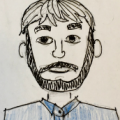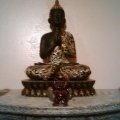The Tao and nature
 Jeroen
Not all those who wander are lostNetherlands Veteran
Jeroen
Not all those who wander are lostNetherlands Veteran
I was reading through a few things and I thought this translation of the Tao Te Ching by Archie Bahm was quite good. The whole text can be found online here. It’s interesting because it unfolds the text of the original by thinking of the Tao as nature. It gives a different slant on the ideas, and gives a few interesting hints for practice.
1
Nature can never be completely described, for such a description of Nature would have to duplicate Nature. No name can fully express what it represents.
It is Nature itself, and not any part (or name or description) abstracted from Nature, which is the ultimate source of all that happens, all that comes and goes, begins and ends, is and is not. But to describe Nature as "the ultimate source of all" is still only a description, and such a description is not Nature itself. Yet since, in order to speak of it, we must use words, we shall have to describe it as "the ultimate source of all."
If Nature is inexpressible, he who desires to know Nature as it is in itself will not try to express it in words
Although the existence of Nature and a description of that existence are two different things, yet they are also the same.
For both are ways of existing. That is, a description of existence must have its own existence, which is different from the existence of that which it describes; and so again we have to recognize an existence which cannot be described.2
It is because we single out something and treat it as distinct from other things that we get the idea of its opposite. Beauty, for example, once distinguished, suggests its opposite, ugliness.
And goodness, when we think of it, is naturally opposed to badness.
In face, all distinctions naturally appear as opposites. And opposites get their meaning from each other and find their completion only through each other. The meaning of "is" and "is not" arise from our distinguishing between them.
Likewise "difficult and easy," "long and short," "high and low," "loud and soft," "before and after" - all derive their meanings from each other.
Therefore the intelligent man accepts what is as it is. In seeking to grasp what is, he does not devote himself to the making of distinctions which are then mistaken to be separate existences. In teaching, he teaches, not by describing and pointing out differences, but by example. Whatever is exists, and he sees that nothing is gained by representing what fully exists by a description - another lesser, diluted kind of existence. If something exists which cannot be wholly revealed to him with his viewpoint, he does not demand of it that it be nothing but what it seems to him.
If some one else interprets him, he does not trust that interpretation as being equal to his own existence. If some part of him stands out as if a superior representative of his nature, he will not surrender the rest of his nature to it.
And in not surrendering the whole of his nature to any part of it, he keeps himself intact. This is how the intelligent man preserves his nature.






Comments
Thanks @Kerome
I really like this interpretation as it reflects my own views of the Tao.
Which reminds me of ...
"The wise enjoy nothing in particular and therefore enjoy everything in general"
~Lao Tzu~
Tao Te Ching is one of my fav. spiritual books. Read so many times.
The science
https://www.sciencedirect.com/topics/psychology/tai-chi
7 minute example practice ... so many on youtube ...

Thanks @lobster just what my sister and her bubble friend needs...I did send them a link for beginner Tai Chi lessons by Dr Paul Lam ...however this one seems more straight forward, possibly easier for them to follow....
Never underestimate easy ...
https://spotnitz.com/soft-weak/
Easy does it ...
https://newbuddhist.com/discussion/18942/what-do-buddhists-think-of-the-yin-yang-defining-duality
One of mine too... what I find fascinating is how different translations catch the text from many different angles, I’ve never yet read a translation that didn’t have something to add.
This stanza I particularly like:
Really enjoying this translation. I have bookmarked to revisit and also compare with the translation I am more familiar with.
This passage stuck out today:
"The generous giver gives because he wants to give. The dutiful giver gives because he wants to receive."
If I'm honest, the latter is probably a good way to describe my current approach to Buddhism.
Good plan.
Trade based spirituality ... as in, 'what's in it for me', is fine. We all start somewhere. Generosity to self perhaps. Generous giving or an expression without need of returns or even empty returns, or even bad for good, is eventually the result of the yin-yang swirl ...
You could give your selfish generosity to someone ... a sort of positive covid viral meme exchange ... or practice healing ...
Tao only gives
Glad that you are getting something out of it, it is turning into one of my favourites. I’ve read about five different translations but this one expands out the ideas in a very nice way.
That rings some bells with me about the practice of virtue, and uncovering within onesself the impulses that lead one to be virtuous.
It sort of challenges what a translation is, but this is very common for translations of the Dàodéjīng. Consider the first division of the first chapter:
道可道非常道。
名可名非常名。
Twelve words, incredibly sparse, very simple, and very formulaic. The Dàodéjīng is full of parallel phrases (i.e. "Named, it is such and such. Unnamed, it is such and such" etc.) that build upon each other.
Compare this yet-unreadable sparse Chinese with nearly any popular English translation:
I would go with: "The way 道 that is walked 可道 is not 非 the eternal way 常道. The name 名 that is named 可名 is not 非 the eternal name 常名." Short and sweet, but also ambiguous. Translations like Goddard's, that introduce and add qualifiers like "primal," "cosmic," etc., are their attempts to interpret.
Looking at the Chinese, I can't figure out where Archie Bahm is getting any of his words. This simply isn't the Chinese text. It seems to be a novel or series of reflections on possible implications the original text might have, but this seems to not really be a translation. I'm not sure if Archie Baum is actually a translator, or if he is a philosopher who read a lot of English translations of the text and decided to give it "his spin." Power to him, of course. Giving things "our spin" at one point or another is part of the process of learning, one could say.
Just consider how incredibly verbose Baum's rendition of Chapter 1 is compared to the extremely simple and sparse Chinese.
(DDJ Chapter 1)
Now, I'm not offering mine as the perfect counterpoint to Baum's translation. People are going to connect with, or not connect with, what they will. Indeed, just to poke holes at this rendering, there's a lot of things in here that aren't easily accessible to a non-specialist reader. What's "ten thousand things?" Why are ten thousand random things relevant? What is the mystery that is seen? What are the surfaces?
IMO there's a sweet spot to be hit in-between renditions like the one I just churned out: esoteric and difficult to make sense of, and what I would call "populist" philosophical interpretations which seek to try to present this material in familiar language. I've never seen anyone hit it, certainly not myself, but this is also a very tricky text, famously tricky, even for native Chinese philosophers, let alone Westerly philosophers with a Orientalist bent to them.
Very true @Vimalajāti and I’ve also seen Archie Bahm’s translation criticised for veering totally away from the poetry of the Tao Te Ching, which is another dimension of the text. You could say the poetry is not important, certainly Bahm thought so, but at the same time the resonance of poetry helps inspire and captivate readers of spiritual texts.
Still I find the fact that Bahm’s text is expanded and clarified really useful as to exploring the deeper meaning of many of the verses. It’s like reading the text and a commentary in one, and you can see some of Bahm’s practical life experience reflected in his choice of phrasing.
But I certainly agree with you that it isn’t strictly speaking a translation, more a re-wording.
Another gem is the Héshàng Gōng (~200AD), a "commentary" to the Dàodéjīng named after its author. I say "commentary" because it's not at all the sort of "commentarial" text that seeks to expand the original in the sense of analyzing the source text with quotations and comments on them. Instead, it is like a poetic rhapsody on the themes of each chapter. Here is the Héshàng Gōng commentary to the first chapter of the Dàodéjīng:
thanks vim.,enjoyed the offering.
on another note,imo,the dao is gracious to greet western mindset by the phrase ....love is.the western mindset was aware god is love.kind ,patient...wonderful soft energy or quality.love is charity,that's dao.the point love is a verb embodied in a noun,hence love is.
for our christian buddhist friend.the clouds,sky can be mystical dao. the clouds,sky,subject to interpritation.
Thanks, I think I may enjoy that. Tonight or tomorrow morning, I'll start reading and will be back. Maybe even after I read each chapter. Why not, right?
Good plan @David
Imagine our body as two crescent moons. If we bow forward, we are passive, receiving. The Great Yin. If we project our ego forward, we are bent into confrontation ...
Taoism teaches us softness. For us crusties, it is a hard softening ... 💗🌛🌜
I am currently sending this a little piece at a time to my cousin, who is very practical and so far has never been interested in the spiritual. Wonder above wonder he is responding with the occasional thumbs-up.
I really did want to get I to this but life is leaving little time for a lot of reading. I am digesting In the Buddhas Words at the moment and I really want to digest it thoroughly.